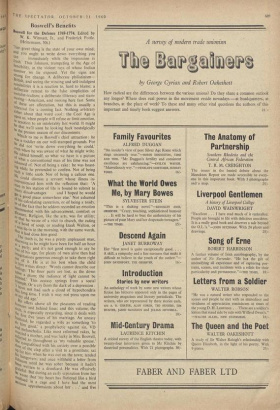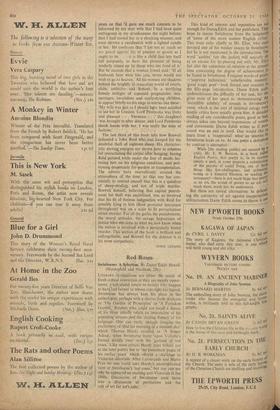Boswell's Benefits
InE great thing is the state of your own mind; and You ought to write down everything you can • immediately while the impression is fresh: Thus Johnson, trumpeting in the Age of Sensibility, in the violent rays of whose Indian summer we lie exposed. Yet the signs are strong for change. A deliberate philistinism- lIritish, and seeing the wincing and self-indulgent sensibilities it is a reaction to, hard to blame; a deliberate retreat to the false simplicities of socialist-realism; a deliberate illiteracy and stam- mering—American, and rooting here fast. Some of these are affectation, but this is usually a rehearsal for a coming fact. Nothing arbitrary either about that word cool: the Cool Age is 11Pun us, when people will refuse or limit emotion, in reaction to an intolerably hot world. It might be that soon be looking back nostalgically to present season of our discontents. t‘ was to me is Boswell's chief attraction: he he a toddler on our well-stamped grounds. For fle did not 'write down everything he could,' He edited himself, so what we have is a picture of what a conventional man of his time was not ashamed of. Not of being a rake: he was boast- jlIg while he pretended to confess. Not of being such a little snob. Nor of being a callous one. e e could dismiss a servant whose illness him with the reflection that: 'A man in his station of life is bound to submit to many disadvantages and I hoped he would tLa good place somewhere else.' Not ashamed of his calculating careerism, or of being a toady, or M Of the fact that he seldom recorded an emotion ple°13 fleeted with his advancement, comfort or 30easUre. Religion, like the arts, was for utility; that he wrote of a visit to church, the eating of a bowl of soup, or reading Izaak Walton, or til'e he-in in the morning, with the same words, it had done him good. ilccharming he truth is, he was a pretty unpleasant man, araling as he might have been for half an hour u2 Party; and it's not good enough to say he uf his
oti agin age ou
genet plenty or ugh tomen alive then had at ions take them right inm s.n wri. tcH de iriesc ta: t 'Whios rdbs ecsat nwnohte dn etchreb ec hoidrkeings. The finer parts are lost, as the down Paj a Plum; the radiance of light cannot be trinted: This ecstasy springs from a social cPh. Or a cry from the dark of a depression: thiqave not had such a cloud of hypochondria s 1Y long time t' ' I wish it may not press upon me 1. old ag. here offers above all the pleasures of reading sixth een and behind lines: and this volume, the the is especially rewarding. since it deals with u„,_urst. five years of his marriage. An uneasy uo'°a.nd, he regarded a wife as something 'to andhlm good,' a prophylactic against sin, VD h., Melancholia. Like most reformed rakes, he marked a mother, and was lucky in Mrs. Boswell, she'red to throughout as 'my valuable spouse.' dos sympathised with his anxiety over a possible of the clap after a visit to a prostitute; sat hi; ',or him when he was out on the town; tended loh„Liangevers; and once withheld a letter from he2son until he was sober because it hadn't „,.`" written to a drunkard. He was effusively ite.at„,efill, But during an early separation from her wrote that 'my heart has fluttered like a bird _orifin ed in a cage and I have had the most °us apprehensions about her . . .' and five years on that 'it gave me much concern to be informed by my dear wife that I had been quite outrageous in my drunkenness the night before; that I had cursed her in a shocking manner, and even thrown a candlestick with a lighted candle at her.' He confesses that 'I am not so much on my guard against tits of passion or gloom as I ought to be , . it is like a child that lets itself fall purposely, to have the pleasure of being tenderly raised up by those who are fond of it.' But he records that a woman friend said: 'If all husbands here were like you, wives would not wish to go to heaven.' All his women are shadows behind the brightly lit masculine world of courts, clubs, ambition and honour, In a terrifying female twilight of repeated pregnancies, mis- carriages, invalidism and easily-dying children, to appear briefly.on his stage in entries like these: 'My wife was just as I should have been satisfied to-see her in London. Lord Pembroke was lively and pleasant .. . . Veronica . . .' (his daughter) 'was brought in after dinner, 'and Lord Pembroke shook hands with her. I was really the man of fashion.'
The last third of this book tells how Boswell defended a John Reid who was hanged for the doubtful theft of eighteen sheep. His character- istic darting, energies are shown here in schemes for resuscitating the corpse after hanging; having Reid painted while under the fear of death; lec- turing him on his religious condition; and peti- tioning desperately for pardon or transportation. The editors have marvellously created the atmosphere of the time: so that one has con- tinually to remind oneself that this is a question of sheep-stealing. and not of triple murder. Boswell himself, believing that capital punish- ment for theft was uncivilised, was so involved that his fit of furious indignation with Reid for possibly lying to him (Reid protested innocence throughout) was on a scale to fit prevarication about murder. For all the guilts, the punishments, the moral attitudes,. the savage hypocrisies of justice were the same as what we now know when the nation is involved with a particularly brutal murder. This section of the book is brilliant and unforgettable, and Boswell for the defence is at his most sympathetic.
DORIS LESSING



















































 Previous page
Previous page